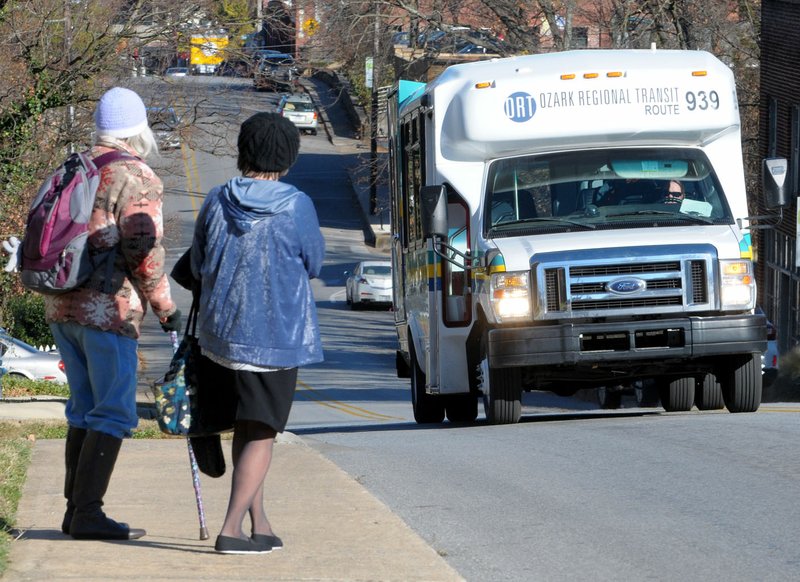SPRINGDALE -- A study for a new, 10-year public transportation plan will focus on public education and establishing bus routes throughout Northwest Arkansas, a consultant has told the Ozark Regional Transit board of directors.
Tim Simon of Alliance Transportation Group, the firm commissioned to do the $280,000 study and plan, spent Wednesday and Thursday visiting with officials from transit providers and the area's larger cities about what to expect. Simon visited Thursday with Ozark Regional Transit officials.
Upward mobility
Ridership on public transit in Fayetteville increased 43 percent in the fourth quarter of 2018, compared to the same quarter in 2017, Ozark Regional Transit officials were told earlier this week. The increase came after route changes late last summer. Routes were streamlined and coordinated with Razorback Transit to reduce redundant service, the frequency of each route was increased and, in some cases, wait times were cut in half. In addition, the city picked up all bus fares for the three Fayetteville ORT routes, making public transit free on all the city’s routes.
Source: Ozark Regional Transit
The region last adopted a transit plan in 2010.
Simon said much of the focus will be on improving local bus routes.
"The focus is on fixing the core, fixed-route, urban transit system on a regional and local basis. So, looking at a regional level, but making detailed recommendations for each community," he said.
Simon said more advanced transit plans could be something to consider down the road. Those could be a light rail system or a rapid transit system that may include dedicated lanes, busways, traffic signal priority, off-board fare collection, elevated platforms and enhanced stations.
"Whether it's the BRT [bus rapid transit] or light rail, I wouldn't put that out there now because you need to fix your foundation," Simon said. "You can build light rail that runs every five minutes up and down the corridor, but what are people going to do when they get off, just wait 15 minutes for a bus? It doesn't work. I think we're going to make recommendations to get your core service up and running."
Tim Conklin, a senior planner at the Northwest Arkansas Regional Planning Commission, said an earlier study found light rail on the Arkansas & Missouri Railroad right-of-way would not have enough ridership to qualify for federal startup money. It would be too expensive to build independently at an estimated $700 million, he said.
Another study looked at bus rapid transit routes on U.S. 71B. Finding money to implement the recommendations has proven to be problematic.
The public will be heavily involved in developing recommendations for the study, and is one of the biggest budget items within the study, Simon said.
"I think there's a fair amount of work to do in that sector, this education sector," said Peter Nierengarten, who was sitting in for Fayetteville representative Don Marr. "There's a lot of misunderstanding. We don't have a demographic that is experienced transit users."
Simon said the study will look at and make recommendations on regional goals and objectives, route design scenarios, local and regional funding sources, performance measures and targets, levels of service and what areas should be served by transit. Land use and housing also will be considered, he said.
"We're going to get ideas and generate ideas, but we're going to come up with something innovative and something that is original here," Simon said. "It's ultimately Northwest Arkansas' plan."
The plan has to be sustainable, scalable and designed to be implemented in phases, he said.
Strategic plans will be developed specifically for public transit providers Ozark Transit and University of Arkansas Razorback Transit to define their roles in a regional system. Individual plans will be developed for the four major cities.
"We're looking forward to this," said Mike Lanier, Ozark Transit board chairman. "It's going to be a very exciting time."
Much of the work will involve talking to as many people as possible to find out what they want and why they don't use the existing transit, Simon said.
Conklin said plans call for working with individual cities to develop centralized stations in order to integrate transit into their communities. They'll also look at how to move people to and from their destinations or homes and those stations.
"I think there's an opportunity to move the region forward over the next 10 years. It has to be funded, everything we're talking about as improvements has to be funded, and this will be part of that discussion," Conklin said.
"We're doing a great job on trails and connecting the region together. Hopefully, as we move forward, we can connect the region together more with fixed-route public transit to make it more efficient."
The Northwest Arkansas Regional Planning Commission, the region's metropolitan transportation organization, selected Alliance Transportation Group to do the study. The project should take 12 to 15 months to complete.
Alliance was selected based on its past experience and expertise in transit planning, ridership forecasting, modeling and its record of completing plans that can be implemented, Conklin said. Allied has worked at the local and state level in Arkansas and is working on numerous projects in the United States, including Austin, Texas, and Boulder, Colo.
Regional Planning decides where and how money for transit is spent as the designated recipient of Federal Transportation Administration money.
Metro on 01/28/2019

